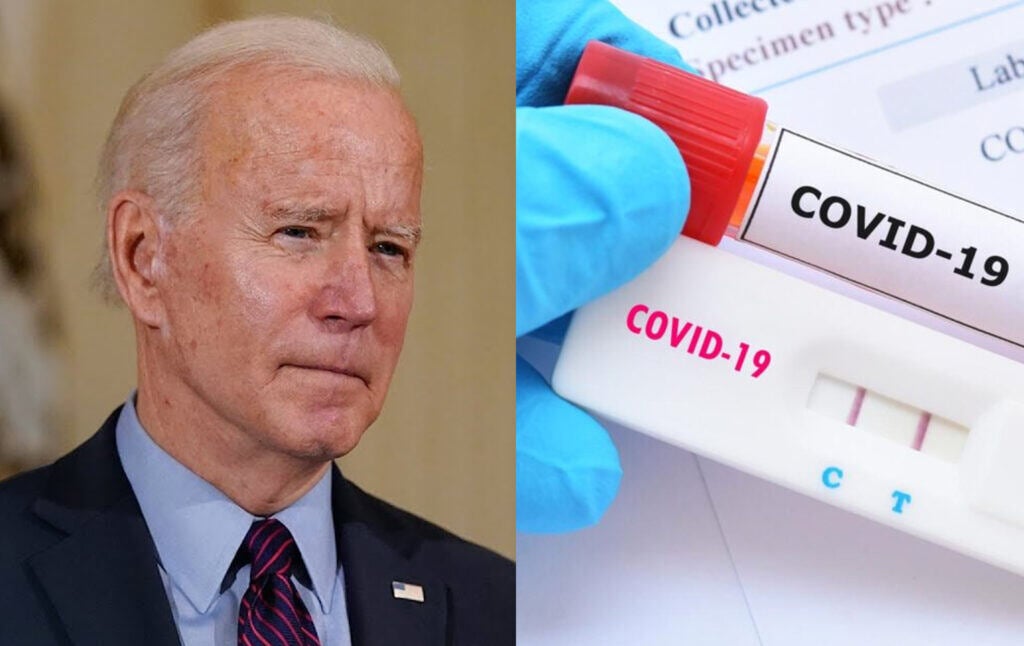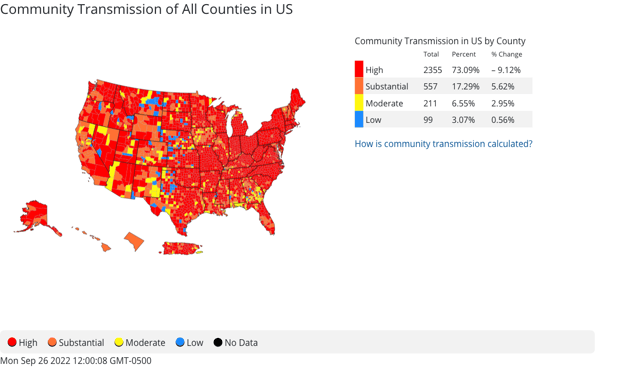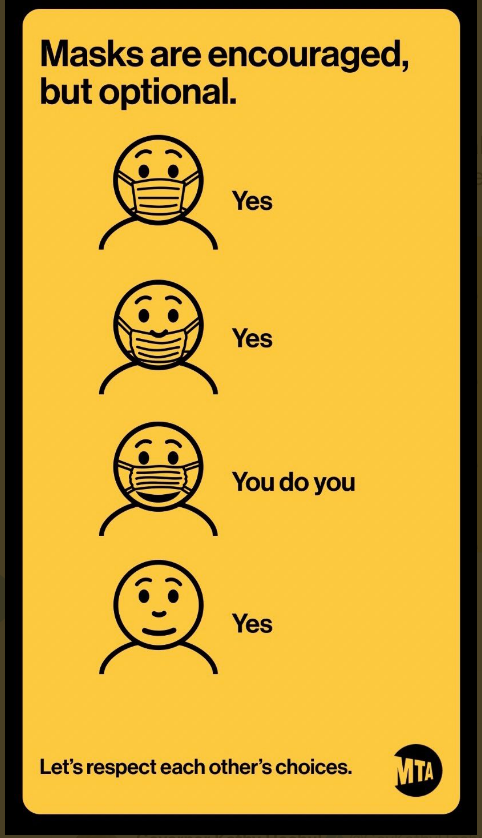
Biden Declared the Pandemic Over. I Immediately Got COVID.
The irresponsible messaging from the White House makes people less likely to think about sensible precautions they could take to minimize their risk.
One week after Joe Biden declared that “the pandemic is over,” I finally contracted COVID-19. I had managed to avoid it up until now. I was careful. But I let my guard down and I got it. Although I can’t say for sure how I caught the virus—transmission levels of the virus are “high” for most parts of the country, according to the CDC, as in the image below—I did have contact with a person who had symptoms of a cold. “How could I be so stupid?” I thought to myself. Even though my contact only had a cold, it didn’t even cross my mind to ask them to get tested for COVID. A year ago, there was no way I would have come in the vicinity of a sick person without being masked and making sure they’d been tested. But I’d just stopped thinking about it, and so I didn’t take the obvious, easy steps that could have kept me from getting it.

I do not completely blame Joe Biden for my case of COVID, but I do partly blame Joe Biden. “The pandemic is over.” What a ridiculously stupid thing to say when around 400 people a day are dying still. It’s the fourth-leading cause of death in the U.S. It’s obviously not “over,” because tens of thousands of people get COVID every day and millions more continue to have or be at risk for health problems from their infection or symptoms of Long COVID. Even worse, the most vulnerable among us—infants in the first six months of life and elderly people—face hospitalization at the highest rates.
As Gina Kolata wrote in the New York Times in 2020, “pandemics typically have two types of endings: the medical, which occurs when the incidence and death rates plummet, and the social, when the epidemic of fear about the disease wanes.” While people aren’t dying at such high rates as earlier in the pandemic—there have been decreases in mortality among hospitalized patients—it’s not at all clear that hundreds of daily deaths are acceptable to the point that we should consider the pandemic medically “over.” Biden was certainly right that people have started acting like the pandemic is over from a social standpoint. Officials have largely ended sensible precautions like general mask mandates. Recent Gallup polling shows that people have returned to in-person grocery shopping and dining to nearly pre-pandemic levels.(Recent polling also shows that a decreasing percentage of people are optimistic about the pandemic and an increasing percentage think the situation is “getting worse.”) But it’s the job of the president to acknowledge the full reality of COVID and not to tell the country comforting lies. “The pandemic is over” is a downright Trumpian lie that feeds right into what science writer Ed Yong has termed America’s “long pandemic defeat.”
I say I blame Joe Biden for my own sickness because we can easily see how a difference in messaging can affect behavior. If the president treats the pandemic as unimportant, it will be easier for us all to forget about it, until reality catches up with us. On the other hand, the president’s message could have been: “The pandemic is not over. Make sure you remember that COVID is everywhere. It’s in the indoor air you breathe even if no one else is around you. Don’t go near sick people you think might have COVID.” Do I think that if Biden had said that, I might have remembered COVID before going near a sick person? I don’t know. But I do know that messaging has consequences. We need to be encouraged to make good decisions and not to make mistakes that could get us (and others) killed. If people stop worrying about COVID because they’re told by their government they don’t need to, many more of us will catch it and die.
When Donald Trump was president, Republicans were utterly irresponsible with their COVID messaging, treating masks as a form of oppression. But Democrats, who don’t want to be the bringers of bad news, have slipped into their own kind of irresponsibility. New York governor Kathy Hochul recently unveiled an absolutely insane dystopian advertisement for the NYC subway, in which people are told that they can wear masks any way they like, even if the mask leaves their nose or mouth uncovered. “You do you,” said the ad.

We can conceive of what better messaging might look like. What we want to do is to motivate people to help themselves and the wider community stay healthy during a pandemic, which may involve any of the following: wearing masks, avoiding certain indoor gatherings, performing rapid testing in the home, getting vaccinated, and so forth. In order to promote altruism (also called prosocial behavior) around COVID, public messaging campaigns ought to include certain components, according to researchers. Asks to the public should:
- Communicate that the desired behaviors are not merely individual choices, but instead constitute a public good. (People need to be reminded that when they are cavalier about COVID, it’s not just themselves that they endanger. When you spread the virus to others, you are increasing the risk that someone will ultimately die of the disease who would not have if you’d taken more care.)
- Make the ask unambiguous, categorical, and concise.
- Generate the impression that others expect compliance.
Ideally, if we want people to wear masks and regularly test, we need to give effective messaging and instruction around masks and supply people with the masks and tests.

Joe Biden could have said something like: “The pandemic isn’t over. Too many people are still dying from the virus in our communities every day. Take sensible precautions such as wearing a mask. It’s easy, and many people support mask-wearing. You might save someone’s life by simply putting on a mask. And make sure you test yourself if you think you might have been exposed, so that you don’t risk infecting others unknowingly.” That’s the right message. It doesn’t mean we’re going back to the shutdowns of the pandemic’s peak, but it does mean that people should be reminded that the risk is there and they ought to be careful.
There is a middle ground between maintaining the most stringent anti-COVID measures and just wishfully pretending the virus is gone when it clearly isn’t. It’s the responsibility of those in power not to just lie to us and tell us to go about our business and be as irresponsible as we like, but to show leadership so that as few people contract, suffer from, and die of this horrible illness as possible.
I don’t feel very good right now, although I’m likely to come out fine on the other side. I’ve got a terrible headache that’s going to cause me to miss some work, and I’m worried that the magazine will suffer. (You can assuage my fears by subscribing, becoming a patron, or donating to help keep the magazine afloat during my convalescence.) Just add my small productivity hit to the colossal economic harm that has already resulted from this disaster. (Side note: having COVID makes me even more interested to know how this pandemic actually began, since now I have an additional personal stake.)
One of the most horrible things about this pandemic has been the lack of any serious determination to do anything to stop it, or even much to mitigate its effects. There appears to be a bipartisan consensus that what will be, will be. I have seen, in the last two years, hardly any public health messaging in YouTube ads or on billboards. The right-wing attitude has won out. You do you. The weak will die. What can you do? The Wall Street Journal has been trying hard to convince people they have had COVID even if they think they haven’t. This kind of messaging certainly isn’t going to help anyone think that they ought to do things to avoid exposure to COVID or to think about not giving COVID to someone else.1
Our country needs COVID messaging that is up to the task at hand. We need a pandemic (and, while we’re at it, climate science) advertising campaign on the level of what we had for past wars. Humans can be persuaded to do a lot of things under the right conditions. Humans are not, as the right-wing story goes, simply selfish and individualistic creatures out for personal gain. In the past, we used war propaganda to inspire people to change their diets, jobs, and lifestyles to support the troops. The troops were going to kill other people, of course, and many were going to die themselves in this process, but this fact was dressed up in positive themes around patriotism and freedom and empowerment. Today we can inspire people to act to keep themselves, their families, their friends, and fellow community members safe by appealing to people’s need for safety, hope, empowerment, and solidarity.
The bare minimum here on messaging is not to declare victory when the virus is obviously spreading at significant levels. You could avoid actively encouraging people to embrace the comforting delusion that the pandemic is over. It’s not over for the thousands of people who get the disease every day, and now you can add me to the number.
Ralph Nader says that the U.S. operates as a “democracy of minimums” (minimal pay, minimal education, minimal healthcare, etc.). In that light, Biden’s messaging reflects not just a flippant dismissal of the medical reality of COVID but belies a far darker truth as explained by epidemiologist Justin Feldman:“Things become much clearer when you realize the debate [ab]out whether we’re in a pandemic is actually a debate about whether the ruling class should do anything to address the pandemic.” Feldman also gave an excellent talk in which he argued that the country’s pandemic response has been used to “assimilate” COVID into a narrative of personal responsibility and choice which characterizes the way we treat other chronic social problems such as racism, environmental pollution, or poverty. ↩




